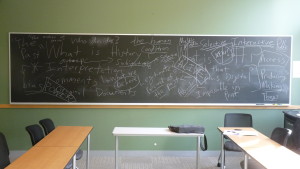 One thing professional scholars everywhere love to do is to categorize, define, and explain, to erect borders and boundaries and partitions. There is a good reason the word “discipline” is at the heart of the academic industrial complex. It is discipline in both the good, self-control, zen sense and the bad, Michel Foucault sense of the word. There has been much debate over the past several years about whether Digital Humanities, and its subset Digital History, constitutes its own discipline, or whether it is fundamentally trans-disciplinary at its core. And what academic discipline worthy of the name is not essentially trans-disciplinary, anyway? Try as we might to impose categories on living reality, to sort into neat boxes of genus, species, and phylum, reality is not that static. It is constantly evolving, always in motion, always transitioning from one thing to the next.
One thing professional scholars everywhere love to do is to categorize, define, and explain, to erect borders and boundaries and partitions. There is a good reason the word “discipline” is at the heart of the academic industrial complex. It is discipline in both the good, self-control, zen sense and the bad, Michel Foucault sense of the word. There has been much debate over the past several years about whether Digital Humanities, and its subset Digital History, constitutes its own discipline, or whether it is fundamentally trans-disciplinary at its core. And what academic discipline worthy of the name is not essentially trans-disciplinary, anyway? Try as we might to impose categories on living reality, to sort into neat boxes of genus, species, and phylum, reality is not that static. It is constantly evolving, always in motion, always transitioning from one thing to the next.
There are a great many extremely interesting documents and manifestos floating around the web attempting to draw boundaries around the digital humanities, to tie it down, to reign it in and discipline it (in the Foucauldian sense). Jason Heppler’s approach to this problem, which presents a different definition each time the page is refreshed, continually remixing them into infinite combinations, is one of the best I have seen. Digital History, like the Digital Humanities, is a broad camp, capable of accommodating everything from the whimsical Serendip-o-matic to the brutal historiographical battles erupting on the back end of prominent Wikipedia pages. The Promise of Digital History, a Journal of American History roundtable discussion from way back in 2008, is a fair introduction to this particular genre of the digital. A breakdown of the document using Voyant reveals, among other things, a strong emphasis on open access. Together, these two words appear a total of 97 times. Ironically, and perhaps appropriately, the exchange itself is a daunting and hopelessly difficult-to-digest wall of text.
At the heart of this definitional battle is a fundamental status anxiety. Is Digital History just regular old history plus expensive computers? Is it, as Adam Kirsch argues about digital literary studies, just “fancy reiterations of conventional wisdom?” Or does it represent something new and qualitatively different? When I posed this question to my students this year, it produced some fascinating results.
Being one of those definition-obsessed academics, I always ask my students to unpack what may seem like everyday or familiar terms. What is freedom? What is slavery? What is civil war? What is Africa? What is America? So when tasked with teaching Digital History to a group of undergraduates, I naturally asked them to define what exactly that means. Actually, I first asked them to define History proper, and then we tried to figure out what makes it so different when done digitally. Of course, we were not alone in this endeavor. It is deeply interesting to observe different classes in different parts of the country generate different responses to similar prompts. Our answers, some of which you can see if you click on the chalkboard above, ranged from Cervantes and Foucault to the practical and the public. I suspect that if I had asked my students at the end of the class, after they submitted their final project, they would have added that Digital History is also really hard work. It requires discipline.